How to hold a pandemic election - 100 days before Scotland's own
It is now just 100 days until the scheduled Scottish Parliamentary elections take place on May 6, with the decision to go ahead with the poll still under intense political scrutiny.
First Minister Nicola Sturgeon has previously said she sees “no reason” why the vote could not go ahead as planned, but has come under pressure from opposition parties to delay the poll due to safety fears.
Advertisement
Hide AdAdvertisement
Hide AdBefore Christmas, Holyrood passed its election bill that legislates for a delay and certain changes to how the poll is undertaken.


Parliament could, on a cross-party basis, seek to delay the postponement of the election or have it take place over multiple days or with a postal vote only system.
The Presiding Officer has been given the power to delay the vote by up to six months, with the dissolution of parliament moved to May 5 to allow for emergency Covid-19 legislation to be passed.
Looking globally, there are clues as to how Scotland could hold its own elections without requiring a delay.
According to the latest data from the International Institute for Democracy and Electoral Assistance (IDEA), an official United Nations election observer, 101 countries have held elections during the pandemic, with 75 countries postponing their elections.
Many of the 75 postponed elections are included in the number of elections that later took place, but in recent months more elections are taking place on schedule than are being postponed.
From October to December last year, IDEA data states more than three quarters of all elections scheduled in the world took place.
Measures used to mitigate the impact varied depending on the country and the type of election taking place.
Portugal
Advertisement
Hide AdAdvertisement
Hide AdWithout an established system for postal voting, Portugal allowed early voting in its presidential election on Sunday, January 24, with nearly 200,000 taking advantage.
Despite being under a second national lockdown, the elections went ahead, but turnout was down 9.2 per cent on the 2016 election.
New Zealand
Initially postponing the election for a month due to concerns around parties being able to campaign effectively without putting their health at risk, alternative voting systems – previously just for those who could not attend a polling station on the day – were extended to the whole of the population.
This included online voting, telephone dictation voting and mobile voting services for those in hospital, care homes and quarantine facilities.
Advanced voting also opened two weeks prior to the polling day, with a higher uptake than ever before.
Voter turnout was 82.49 per cent, higher than 2017, which saw 79.95 per cent of voters turnout.
Singapore
Voting in Singapore is compulsory, meaning the parliamentary elections held on July 10 last year could have led to a significant number of Covid-19 cases.
However, preventative measures were brought in, including temperature screening, social distancing, masks and gloves, and staggered voting times.
Advertisement
Hide AdAdvertisement
Hide AdThis reflected similar tactics used in South Korea early on in the Covid-19 pandemic and included mobile polling teams.
It did lead to long queues at polling stations, but turnout remained around 95 per cent and was the highest since 1997.
Poland
Polish presidential elections took place in the summer, with the first round of voting on June 28 and the second on July 12.
These votes had followed a ‘ghost election’ on May 11 where polling stations shut and no votes were cast following a row over whether the poll should be postal vote only.
However, in June and July, the election was run as normal with similar precautions to other countries in a bid to keep the number of Covid-19 cases down.
Voters were asked to wear masks and gloves, maintain social distancing, use hand sanitiser and bring their own pens.
Dominican Republic
One of the first Latin American countries to hold an election following the global outbreak of Covid-19, the Dominican Republic introduced measures such as mandatory face masks, disinfection of voting materials and social distancing for its poll on July 5.
However, a lack of compliance with protocols and long lines at polling centres meant many waited hours to vote in unsafe environments.
Advertisement
Hide AdAdvertisement
Hide AdTurnout – while high considering the public health context – was lower than previous elections.
In case terms, the election did not lead to a major spike as the growth of Covid-19 continued at a steady rate.
Croatia
Parliamentary elections in Croatia were one of the few elections moved forward by the government, with the vote taking place on July 5 rather than in autumn.
Initially it was made illegal for Covid-19 patients to vote. This was later reversed, with proxy voting allowed instead and mobile voting made available for those self-isolating.
No other special election arrangements were in place, but face masks were mandatory for poll workers and advised for voters, with surfaces cleaned and social distancing in place.
Turnout was lower than the previous election at 46.9 per cent compared to 52.6 per cent. Covid-19 cases rose after the election, but were not directly attributable to the poll.
Iceland
One of the countries which managed to suppress Covid-19 to a low level and keep it there, elections in Iceland proceeded much as normal.
Gatherings of up to 200 people were allowed, with social distancing considered more of a “social norm” and a courtesy to those at risk than a rule.
Advertisement
Hide AdAdvertisement
Hide AdPeople voted in advance in staggered phases from May 25 up to election day itself on June 27, with people self-isolating due to Covid-19 allowed to vote from their car in a similar way to the way tests are administered at airports in the UK.
Turnout was lower than previous years at 66.93 per cent compared to 75.67 per cent in 2016.
A message from the Editor:
Thank you for reading this article. We're more reliant on your support than ever as the shift in consumer habits brought about by coronavirus impacts our advertisers.
If you haven't already, please consider supporting our trusted, fact-checked journalism by taking out a digital subscription.
Comments
Want to join the conversation? Please or to comment on this article.
